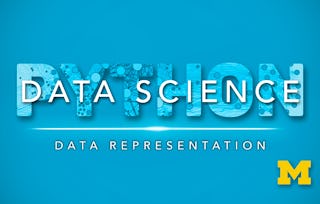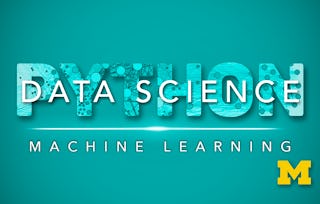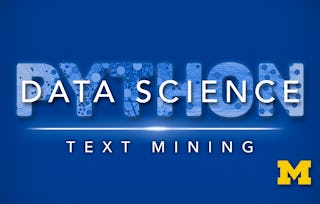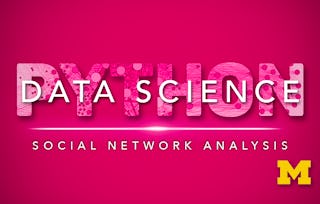This course will introduce the learner to the basics of the python programming environment, including fundamental python programming techniques such as lambdas, reading and manipulating csv files, and the numpy library. The course will introduce data manipulation and cleaning techniques using the popular python pandas data science library and introduce the abstraction of the Series and DataFrame as the central data structures for data analysis, along with tutorials on how to use functions such as groupby, merge, and pivot tables effectively. By the end of this course, students will be able to take tabular data, clean it, manipulate it, and run basic inferential statistical analyses.

Introduction to Data Science in Python

Introduction to Data Science in Python
This course is part of Applied Data Science with Python Specialization

Instructor: Christopher Brooks
853,631 already enrolled
Included with
27,265 reviews
What you'll learn
Understand techniques such as lambdas and manipulating csv files
Describe common Python functionality and features used for data science
Query DataFrame structures for cleaning and processing
Explain distributions, sampling, and t-tests
Skills you'll gain
Details to know

Add to your LinkedIn profile
9 assignments
See how employees at top companies are mastering in-demand skills

Build your subject-matter expertise
- Learn new concepts from industry experts
- Gain a foundational understanding of a subject or tool
- Develop job-relevant skills with hands-on projects
- Earn a shareable career certificate

There are 4 modules in this course
In this module, you'll get an introduction to the field of data science, review common Python functionality and features that data scientists use, and be introduced to the Coursera Jupyter Notebook for the lectures. All of the course information on grading, prerequisites, and expectations are on the course syllabus, and you can find more information about the Jupyter Notebooks on our Course Resources page.
What's included
20 videos4 readings3 assignments1 programming assignment2 ungraded labs1 plugin
In this module of the course, you'll learn the fundamentals of one of the most important toolkits Python has for data cleaning and processing -- pandas. You'll learn how to read in data into DataFrame structures, how to query these structures, and the details about such structures are indexed.
What's included
13 videos1 reading3 assignments1 programming assignment1 ungraded lab
In this module, you'll deepen your understanding of the python pandas library by learning how to merge DataFrames, generate summary tables, group data into logical pieces, and manipulate dates. We'll also refresh your understanding of scales of data, and discuss issues with creating metrics for analysis. The week ends with a more significant programming assignment.
What's included
12 videos1 reading2 assignments1 programming assignment1 ungraded lab
In this final module of the course, you'll be introduced to a variety of statistical techniques such a distributions, sampling and t-tests. The week ends with two discussions of science and the rise of the fourth paradigm -- data driven discovery.
What's included
2 videos6 readings1 assignment1 programming assignment1 ungraded lab
Earn a career certificate
Add this credential to your LinkedIn profile, resume, or CV. Share it on social media and in your performance review.
Instructor

Offered by
Explore more from Data Analysis

University of Michigan

University of Michigan

University of Michigan

University of Michigan
Why people choose Coursera for their career

Felipe M.

Jennifer J.

Larry W.

Chaitanya A.
Learner reviews
- 5 stars
66.34%
- 4 stars
24.24%
- 3 stars
5.36%
- 2 stars
1.92%
- 1 star
2.12%
Showing 3 of 27265
Reviewed on Jun 17, 2020
Um curso intenso e bastante prazeroso. Gostei de todas as etapas, os videos funcionam bem e estão construidos numa base introdutória, mas o desafio é pesquisar e pesquisar. Muito interessante mesmo!
Reviewed on Nov 18, 2016
Although the tests can be a bit fiddly, this is a great course if you already have a bit of background with Python and/or data cleaning. Lecture and tutorial videos are lean and information-dense.
Reviewed on Jul 26, 2020
Quizzes were very challenging and interesting. I learned alot. The main drawback in this course is that the materials are insufficient to answer the assignments.And some questions were not so clear.

Open new doors with Coursera Plus
Unlimited access to 10,000+ world-class courses, hands-on projects, and job-ready certificate programs - all included in your subscription
Advance your career with an online degree
Earn a degree from world-class universities - 100% online
Join over 3,400 global companies that choose Coursera for Business
Upskill your employees to excel in the digital economy
Frequently asked questions
To access the course materials, assignments and to earn a Certificate, you will need to purchase the Certificate experience when you enroll in a course. You can try a Free Trial instead, or apply for Financial Aid. The course may offer 'Full Course, No Certificate' instead. This option lets you see all course materials, submit required assessments, and get a final grade. This also means that you will not be able to purchase a Certificate experience.
When you enroll in the course, you get access to all of the courses in the Specialization, and you earn a certificate when you complete the work. Your electronic Certificate will be added to your Accomplishments page - from there, you can print your Certificate or add it to your LinkedIn profile.
Yes. In select learning programs, you can apply for financial aid or a scholarship if you can’t afford the enrollment fee. If fin aid or scholarship is available for your learning program selection, you’ll find a link to apply on the description page.
More questions
Financial aid available,

